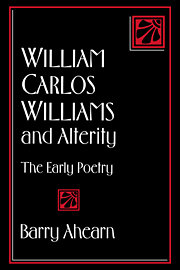Afterword: 1923–1963
Published online by Cambridge University Press: 05 January 2012
Summary
Williams's subsequent career suggests that the remarkable skill he demonstrated in constructing a poetry of transitions proved his undoing, at least temporarily. The aesthetic of modulated contrariness had been so thoroughly perfected that it is hard to see where Williams could have taken it from there. Of course we shall never know what such effort along the same lines would have produced. Williams had brought his poetic of alterity to such a pitch of perfection in Spring and All that he probably saw little to be gained by continuing to make it even more intricate. He found himself at an impasse, as his career in the years immediately following 1923 indicates. His production of lyric poems declined, both in quantity and in quality.
The work after Spring and All shows Williams groping toward a poetic that would be grounded in an absolute standard. But since such an effort ran against the grain of Williams himself, he was persistently dissatisfied with absolute assurance. The poem that appears to be his last, “Stormy” (CP2, 380), which is about an exuberant puppy, echoes the poem that Williams claimed as his first, the untitled one about a storm cloud (A, 47). Williams's irrepressible inclination toward alterity – even toward the chaotic – diminished over the years, but was finally ineradicable.
Thomas Whitaker has noted the new direction Williams took in the decade after Spring and All; he “was seeking more inclusive forms that might render his sense of community and history”(1989: 50).
- Type
- Chapter
- Information
- William Carlos Williams and AlterityThe Early Poetry, pp. 154 - 162Publisher: Cambridge University PressPrint publication year: 1994



